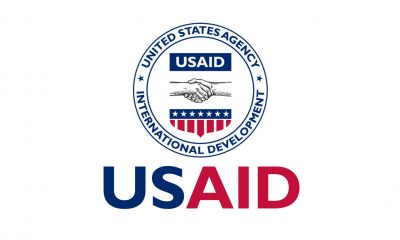Health
FG Moves To Stem Maternal Mortality
A nutritionist, Dr Chris Isokpunwu, recently said the
Federal Government would work towards the eradication of micronutrient
deficiencies in women and children to reduce the risk of maternal mortality.
Isokpunwu, Head, Nutrition Division, Federal Ministry of
Health, said this at a two-day maiden Nestle Nigeria Plc sponsored forum on
Creating Shared Value (CSV) in Lagos.
The theme of the forum is “The Role of Business in Food
Security and Nutrition.”
“A micronutrient deficiency (or trace mineral deficiency)
represents a human physiological disorder which occurs when a person’s diet does
not contain required nutrients.
“And or when illnesses (such as diarrhoea or malaria) cause
rapid loss of nutrients through feces or vomit,” the Wikipedia said.
Also, the World Health Organisation (WHO) said; “Vitamin A
deficiency (VAD) is the leading cause of preventable blindness in children and
increases the risk of disease and death from severe infections.
“In pregnant women, VAD causes night blindness and may
increase the risk of maternal mortality.”
Isokpunwu said; “The main focus when we are talking about
micronutrient deficiency is on women and children in the first 1,000 days of
their lives.
“Micronutrient deficiencies can be prevented and even
eliminated, if small quantities of the micronutrients are consumed by an
individual on a continuous and ongoing basis.
“Integrated approaches are recommended to reduce and ideally
eliminate micronutrient deficiencies.’’
The nutritionist said that the known interventions like
supplementation, fortification of staple and widely consumed accessible foods including
bouillons, dietary improvement and public health measures have been very
successful worldwide.
A nutritionist from Cote d’ Ivoire, Dr Ouattara Sanga, said
that universal food fortification was one of the means of fighting against
micronutrient deficiency.
Sanga said that nutritional education would go a long way to
create awareness on how food fortification could be effective.
Mr Martin Woolnough, Managing Director, Nestle Nigeria Plc,
said that the forum was basically to exchange ideas with top nutritionists on
how to create shared value.
He said that the discussions would address the challenges of
nutrition, water and rural development in the context of food security,
environmental sustainability and greater economic opportunity.
Health
‘How Micro RNA Research Won Nobel Prize’
Two United States scientists who unraveled the human micro RNA have won the Nobel Prize in Physiology or Medicine 2024.
Victor Ambros and Gary Ruvkun won the coveted prize for their work on microRNA as their discoveries help explain how complex life emerged on earth and how the human body is made up of a wide variety of different tissues.
MicroRNAs influence how genes – the instructions for life – are controlled inside organisms, including humans.
Every cell in the human body contains the same raw genetic information, locked in our DNA.
However, despite starting with the identical genetic information, the cells of the human body are wildly different in form and function.
The electrical impulses of nerve cells are distinct from the rhythmic beating of heart cells. The metabolic powerhouse that is a liver cell is distinct to a kidney cell, which filters urea out of the blood.
The light-sensing abilities of cells in the retina are different in skillset to white blood cells that produce antibodies to fight infection.
So much variety can arise from the same starting material because of gene expression.
The US scientists were the first to discover microRNAs and how they exerted control on how genes are expressed differently in different tissues.
The medicine and physiology prize winners are selected by the Nobel Assembly of Sweden’s Karolinska Institute.
They said: “Their groundbreaking discovery revealed a completely new principle of gene regulation that turned out to be essential for multicellular organisms, including humans.
“It is now known that the human genome codes for over 1,000 microRNAs.”
Health
WHO Begins Regulation On Antibiotic Waste
The World Health Organisation (WHO) has begun acting to curb effects of antibiotic pollution.
The new guidance on wastewater and solid waste management for antibiotic manufacturing sheds light on this important but neglected challenge ahead of the United Nations General Assembly (UNGA) High-Level Meeting on antimicrobial resistance (AMR) taking place on 26 September 2024.
The emergence and spread of AMR caused by antibiotic pollution could undermine the effectiveness of antibiotics globally, including the medicines produced at the manufacturing sites responsible for the pollution.
Despite high antibiotic pollution levels being widely documented, the issue is largely unregulated and quality assurance criteria typically do not address environmental emissions. In addition, once distributed, there is a lack of information provided to consumers on how to dispose of antibiotics when they are not used, for example, when they expire or when a course is finished but there is still antibiotic left over.
“Pharmaceutical waste from antibiotic manufacturing can facilitate the emergence of new drug-resistant bacteria, which can spread globally and threaten our health. Controlling pollution from antibiotic production contributes to keeping these life-saving medicines effective for everyone,” said Dr Yukiko Nakatani, WHO Assistant Director-General for AMR ad interim.
Globally, there is a lack of accessible information on the environmental damage caused by manufacturing of medicines.
“The guidance provides an independent and impartial scientific basis for regulators, procurers, inspectors, and industry themselves to include robust antibiotic pollution control in their standards,” said Dr Maria Neira, Director, Department of Environment, Climate Change and Health, WHO. “Critically, the strong focus on transparency will equip buyers, investors and the general public to make decisions that account for manufacturers’ efforts to control antibiotic pollution.”
Health
Kebbi Harmonises Doctors’ Salaries To Curb Brain Drain
In a concerted effort to curb brain drain, the Kebbi State Government has harmonised medical doctors’ salaries to be at par with their colleagues in the federal government’s tertiary health facilities.
Kebbi State Commissioner for Health, Musa Inusa-Isma’il, disclosed this at the handing over of ambulances to the state-owned health facilities at the Ministry of Health in Birnin Kebbi yesterday.
Inusa Isma’il, according to a statement by Ahmed Idris, the Chief Press Secretary to the governor, said the essence of the harmonisation was to retain the existing medical doctors and attract more to the services of the state.
According to him, the doctors across the state had already started enjoying the new salaries from August 2024.
He said the release of the vehicles was in fulfilment of Governor Nasir Idris’ promise to uplift health care services in the state.
“His Excellency said I should inform you, the beneficiaries of this gesture, that the vehicle should be strictly used for the intended purpose. It should not be used for anything else.
“If there is no referral case, each of the vehicles must be parked at the hospital by 6 pm. The governor said you should warn your drivers against reckless driving as well as violating the instructions.
“We should also do everything possible to reciprocate the gesture by working according to the terms and conditions attached,” he advised.
The benefiting health facilities included Sir Yahaya Memorial Hospital, Birnin Kebbi; State Teaching Hospital, Kalgo; General Hospital, Argungu; General Hospital, Yauri; General Hospital, Zuru; and General Hospital, Bunza.
In his speech, the permanent secretary of the ministry, Dr Shehu Koko, recalled that the ambulances were handed over to the ministry last Friday by the governor for the onward handover to the benefiting hospitals.
He observed that the ambulances would go a long way in improving the referral system in the state, adding that delays in reaching the secondary and tertiary facilities would be eliminated.
The permanent secretary attributed the high rate of maternal mortality in the country to delays in getting to the health facilities for proper medical care.
“We believe with the provision of these ambulances, part of the gaps we have in our referral system will be addressed, whereby patients who require secondary healthcare could be easily transported to secondary and tertiary health centres, where they can get such help,” he said.
In a goodwill message, Commissioner for Information and Culture Alhaji Yakubu Ahmed expressed gratitude to the governor for the support he has given to the ministry to excel.
While advising the beneficiaries to use the vehicles judiciously, the commissioner advised that services and maintenance of the vehicles must be prompt to derive the maximum benefits from the vehicles.
The commissioner also highlighted some achievements recorded by the government in the last year, including beautification of the state capital, completion of a multimillion-naira ultramodern state secretariat, road construction, construction and renovation of classrooms and upgrading of some health facilities, among others.
-
Rivers3 days ago
Orazi Gas Explosion: 3 Confirmed Dead
-
Rivers3 days ago
ONELGA BOSS ADVICE YOUTHS ON PEACEFUL PATH
-
Women3 days ago
Girl-Child Development And Early Marriage
-

 World3 days ago
World3 days agoPope Francis urges global dialogue to prevent world war
-
Rivers3 days ago
JONAPWD Elections: Commissioner Inaugurates 5-Man Committee
-
Politics3 days ago
When Women Unite To Pray For SIM
-

 Business3 days ago
Business3 days agoUSAID Re-emphasizes Agricultural Collaboration With Nigeria
-

 Featured3 days ago
Featured3 days agoWe’ve Only One House Of Assembly Led By Oko-Jumbo, Fubara Clarifies …Signs Into Law N1.188trn Rivers 2025 Budget

